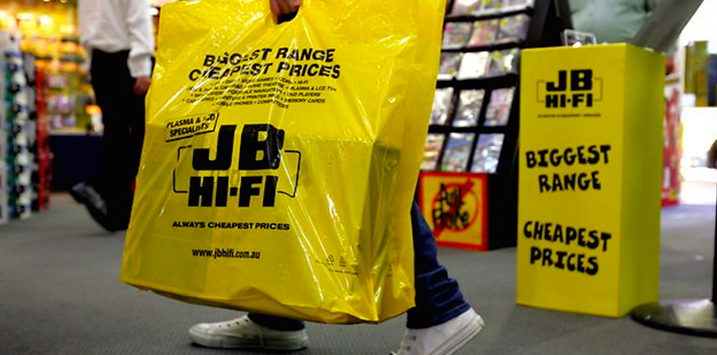
How to assess JB Hi-Fi
The recent move by JB Hi-Fi (JBH:ASX) to acquire The Good Guys has a lot of investors excited. Largely, it seems, because the tie-up will help consolidate the retailer’s pricing power in an already concentrated industry. But while we’re happy to shop there, we’re not yet convinced JBH meets our investment criteria.
One of the time-honoured traditions of the Australian corporate landscape is the maintenance of oligopolistic market structures that make life that little bit easier for the entrenched players. In important industries like banks, telecommunications and supermarkets, we tend to see a relatively small number of strong players, and big gaps between the stronger players and the less so.
This is probably a fact of life in a market the size of Australia’s. In many cases there simply isn’t enough space to allow for a large number of large full-scale, efficient players. Markets can certainly evolve and be disrupted (Aldi being a good example in the supermarket industry), but oligopolistic market structures like this tend to be enduring in a market like ours.
This is not always a great outcome for consumers, who would probably benefit from a bit more competition, but as investors, we need to pay attention to the economic benefits that accrue to shareholders in favourable industry structures.
With this in mind, we have watched with interest the acquisition by JB Hi-Fi of The Good Guys. Electronics retailing in Australia is already a somewhat concentrated industry, especially following the demise of Disk Smith, and this transaction takes us a bit further down the industry consolidation path. Not enough to trigger ACCC issues, but a bit further down the path nonetheless.
This is not to say that JB Hi-Fi will enjoy dramatically increased pricing power following the acquisition, but it is interesting to note that profit margins for JBH are pretty thin, and it doesn’t take much of an increment to price to have a meaningful impact to overall profitability.
We can’t quite see a value case for investing in JBH just at the moment, but will be keeping a close eye on the way competition in the market evolves from here. If we end up having to pay a bit more for that next laptop computer, there may well be a case for taking a position on the other side of the till.
Tim,
How much of a threat to HVN do you think the consolidation represents? The combined entity now has greater market share in electronics AND small appliances than HVN. As part of a publicly listed entity, there’s going to be pressure on Good Guys to expand, which is probably only conceivable by taking market share. Do you think they are more likely to use the scale and synergies from the deal to expand margins, or to move aggressively compete with HVN on price and try and take share?
Hi Hayden. I suspect there could be a net benefit to HVN. Effectively this transaction reduces the number of competitors in appliances and electronics. A lot depends though on whether JBH now seeks to focus on market share or profitability.
Hi Tim,
Do you have any comments regarding the acquisition price JBH paid for The Good Guys? I find it tricky to evaluate whether a company has grabbed a bargain or paid a premium in situations like this.
Thanks
James
Hi James. I don’t think they got a bargain for TGG as a stand-alone business, and synergies are limited. The unknown at this stage is the value of the market structure benefits and strategic optionality that comes with the transaction. These could make it quite an attractive deal.
Hi Tim, thanks for the article.
On a completely separate note, what do you think of the TPG Telecom result? It seems like growth is slowing in a big way in Australia and they have to go offshore to get it – the market doesn’t like it at all.
Thanks.
Kelvin
Hi Kelvin. Taking a bit of time to properly untangle TPM, but: FY17 guidance is significantly below expectations, and seems to imply stagnation of the underlying business, offset by some further IIN synergies. A big part of this seems to be transition to NBN, which on current wholesale and retail prices implies margin compression for RSPs. Too early to tell how the overall revenue pie will be shared between NBN and others, but on current pricing NBN meets its financial targets at the expense of RSPs and/or end users who end up paying a lot more than they do for copper. We suspect that RSPs will either get a better deal from NBN, or they will pass increased costs to consumers – either way their economics should improve from here. Until we see how that is resolved there is a high level of uncertainty, which is no doubt factored in to TPM’s (traditionally conservative) guidance.
Hi Tim, yes their guidance does seem very conservative. Thanks very much for your thoughts, that’s very kind.
Kelvin
Hi Tim – bit of a non-Freudian slip in there referring to Disk Smith?
Surely the big issue for electronic retailers is the ever increasing percentage of sales made over the internet? I see the change in landscape here driven by the likes of Kogan (owners of dicksmith.com.au) more than has affected the banks, telcos and supermarkets who by their nature must operate large businesses locally. What will be interesting to see is whether or not the Good Guys brand is kept and if not whether or not white goods (which are harder to sell on-line) appear in JBH stores. I see the possibility of a reduced number of JBH stores being rebranded as Good Guys (and then selling white goods) whilst the JBH brand does a Harris Technology and move entirely on-line. Either way it seems to me the move is one of providing possibilities and flexibility more so than consolidation. Possibly the ACCC did too.
All good points, Luke.